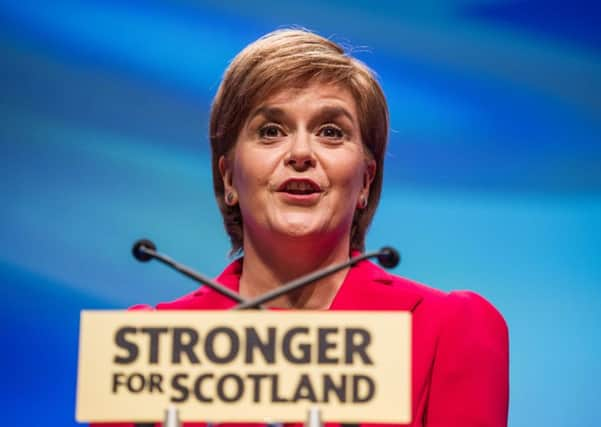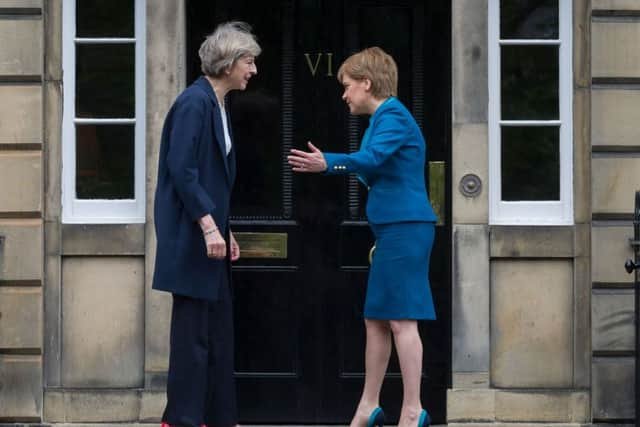Brexit court ruling: Sturgeon considers '˜actively opposing' appeal


The court ruling has dealt a severe blow to Mrs May’s Brexit strategy. The Prime Minister had argued that the June referendum result and ministerial powers meant formal parliamentary support was not needed to implement Article 50 of the Lisbon Treaty, the mechanism that starts the process of EU withdrawal.
The decision is likely to delay Brexit while MPs consider the complexities of the process and there is even the potential for pro-EU politicians to block withdrawal.
Advertisement
Hide AdAdvertisement
Hide Ad

The ruling has also increased speculation that Mrs May could call a general election in an attempt to strengthen her mandate. The UK government vowed yesterday to appeal against the judgment at the Supreme Court. The Prime Minister’s official spokesman said the government had “no intention of letting” the judgment “derail Article 50 or the timetable we have set out. We are determined to continue with our plan”.
But the challenge facing the UK government intensified when Ms Sturgeon indicated the Scottish Government was considering fighting the UK government’s appeal to protect the interests of Scotland.
While constitutional lawyers suggested the Scottish Government could also argue that the Scottish Parliament had the right to hold a vote on Article 50 and potentially block the Brexit process.
At First Minister’s Questions, Ms Sturgeon was asked by the Labour MSP Lewis Macdonald if the Scottish Government would “actively oppose the UK government’s intended appeal when it reaches the UK Supreme Court?”.


Ms Sturgeon replied: “We will be looking at the judgment very carefully and, yes, we will actively consider whether or not there is a case for the Scottish Government to become participants in that case.”
Ms Sturgeon said the High Court judgment was not a “huge surprise” to anybody who followed the case.
“But it is hugely significant and it underlines the total chaos and confusion at the heart of the UK government,” she said.
“We should remember their refusal to allow a vote in the House of Commons is not some matter of high constitutional principle. It is because they don’t have a coherent position and they know that if they take their case to the House of Commons that will be exposed. The job of this government is to protect Scotland’s interests.
Advertisement
Hide AdAdvertisement
Hide Ad“Scotland voted to remain in the EU and my job is therefore to protect our place in Europe and in the single market as far as I possibly can. SNP MPs in the House of Commons will certainly not vote for anything that undermines the will or the interests of the Scottish people.”
The prospect of the Scottish Parliament hampering Brexit was explained by Charles Livingstone, a partner at law firm Brodies LLP and an expert in constitutional law.
Mr Livingstone said: “There is a strong constitutional principle, reflected in the Scotland Act 2016, that Westminster will not legislate on matters that are devolved to the Scottish Parliament without its consent.
“On the premise of today’s decision, legislation to authorise the triggering of Article 50 could be interpreted as inevitably leading to a change in the application of EU law in Scotland, including in devolved areas.
“There could therefore be further constitutional arguments about whether the Scottish Parliament’s consent should be sought before the UK parliament passes legislation permitting the UK government to trigger Article 50.” Later the First Minister’s spokesman said Ms Sturgeon’s view had always been that Brexit required the legislative consent of the Scottish Parliament.
Yesterday’s ruling saw High Court judges find in favour of a challenge mounted last month by campaigners who argued that the Prime Minister cannot use royal prerogative powers to remove rights granted by the 1972 European Communities Act without the approval of MPs.
The decision was announced as a new poll suggested that a slim majority of voters now want Britain to remain in the European Union.
According to the survey conducted by BMG Research, 51 per cent of those asked wanted to stay in the EU compared with 49 per cent who wanted out. In the June referendum the Leave campaign triumphed narrowly by a margin of 52 per cent to 48 per cent.
Advertisement
Hide AdAdvertisement
Hide AdPro-Brexit politicians reacted with anger to the court’s decision. Conservative MP Dominic Raab said it “could end up scuppering” Brexit, while his colleague David Davies attacked “unelected judges calling the shots”.
Mr Raab said if the debate gets to the stage where Remain-backing MPs are threatening to block the triggering of Article 50 in a House of Commons vote, Mrs May could call an election.
But Mrs May’s official spokeswoman told a Westminster media briefing: “Our position has been clear that there should not be an election before 2020. That remains the Prime Minister’s view.”
Ukip leader Nigel Farage claimed the judgment opened the door to a “betrayal” of the EU referendum result and warned of “public anger” if any attempt is made to block Article 50.
Former Liberal Democrat leader Lord Campbell of Pittenweem said it was a “slap in the face” for Mrs May.
Shadow Labour Brexit secretary Sir Keir Starmer said the ruling forced the government to reveal its negotiating strategy with Brussels.
“The Prime Minister was trying to sideline parliament and the court has now ruled against her and reminded her that parliament is sovereign, so the government needs to urgently review its approach and refer this issue to parliament,” Sir Starmer said.
Mrs May will discuss the Brexit process with European Commission president Jean-Claude Juncker today.
